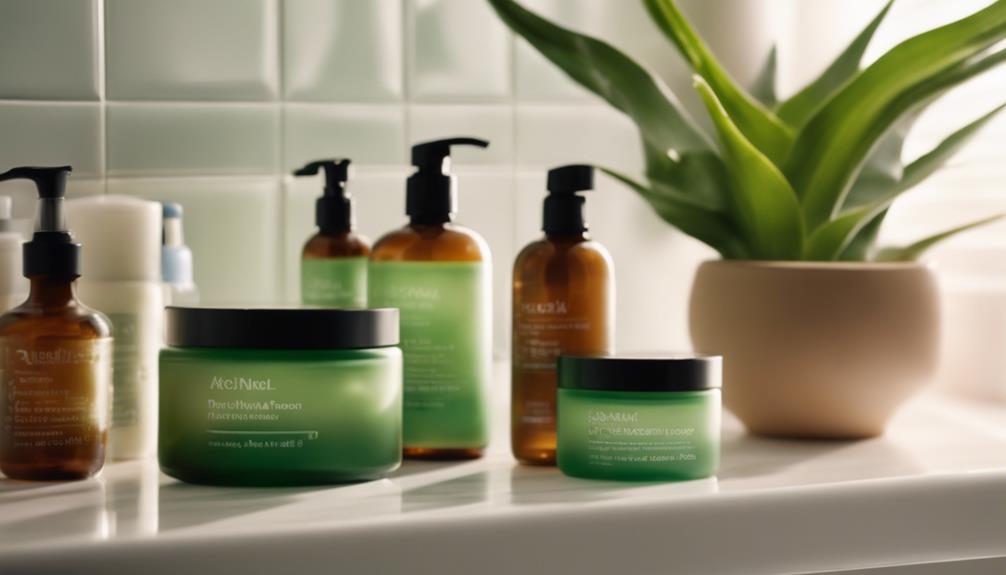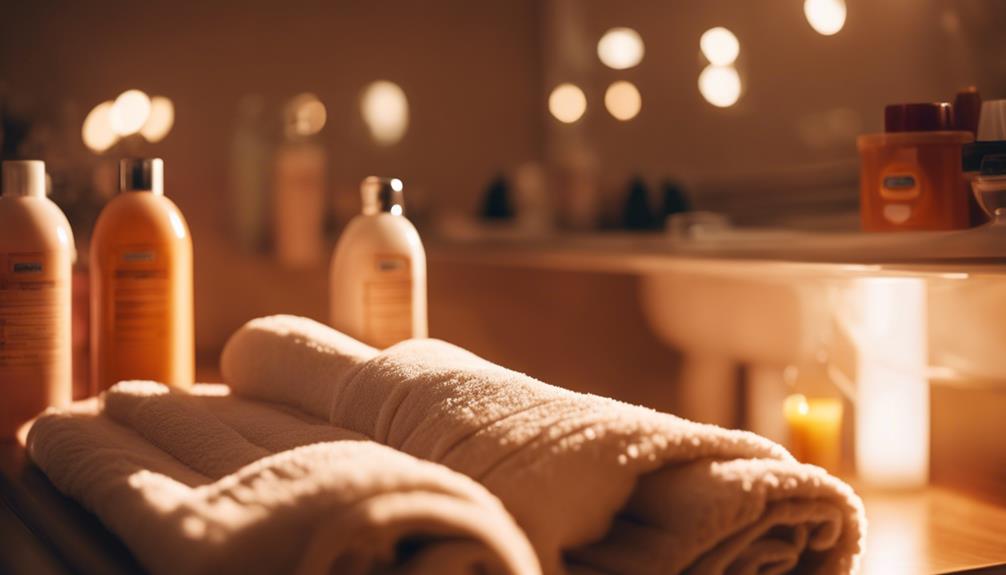Tanning with acne-prone skin can present a challenge, but you can still achieve a radiant look safely. It’s important to start by determining your skin type and using non-comedogenic self-tanners. Before applying any products, lightly exfoliate your skin to ensure an even tan. Always remember to apply a thin layer of moisturizer to create a protective barrier against irritation. After tanning, gently cleanse your skin with a gentle, oil-free cleanser and use a lightweight moisturizer to keep your skin hydrated. Avoid using heavy makeup immediately after tanning to allow your skin to breathe. Stay tuned for more tips to help you enjoy a glowing, breakout-free complexion!
Key Takeaways
- Choose non-comedogenic self-tanners to prevent pore clogging and minimize breakouts on acne-prone skin.
- Lightly exfoliate before tanning to ensure an even application and remove dead skin cells.
- Apply a thin layer of oil-free moisturizer as a protective barrier before using self-tanners.
- Gently cleanse with a mild, non-comedogenic cleanser after tanning to remove product without irritating skin.
Understanding Your Skin Type
Understanding your skin type is essential for choosing the right tanning products that won't aggravate acne.
First, determine if your skin is oily, dry, combination, or sensitive. Each type requires different care. For example, if you have oily skin, you'll want to avoid heavy, comedogenic products that can clog pores. Instead, opt for lightweight, non-comedogenic options.
If your skin's sensitive, always perform a patch test before applying any product across your face or body. Additionally, consider using self-tanners or professional spray tans instead of tanning beds, as they're typically safer for your skin.
Choosing the Right Products
Selecting the right tanning products is crucial for achieving a flawless glow while keeping your acne-prone skin healthy.
Start by choosing non-comedogenic self-tanners that won't clog your pores. Look for oil-free options that contain DHA, as they're safer for your skin.
Avoid using body tanners on your face; instead, opt for bronzers specifically formulated for facial use. Always perform a patch test before applying any product to verify it won't irritate your skin.
Additionally, maintain separate cleansers and moisturizers for pre- and post-tan care to avoid mixing products that could lead to breakouts.
Finally, remember to exfoliate gently before tanning to create an even surface for best results.
Your skin deserves the best care as you achieve that sun-kissed look!
Safe Tanning Techniques

To achieve a safe and effective tan, focus on using gentle techniques that protect your acne-prone skin while enhancing your glow. Start by exfoliating your skin lightly to guarantee an even application. Use non-comedogenic self-tanners or opt for professional spray tans to minimize breakouts. Always apply a thin layer of moisturizer before tanning to create a barrier.
Here's a quick reference table for safe tanning techniques:
| Technique | Description |
|---|---|
| Gentle Exfoliation | Prepares skin for an even tan |
| Non-Comedogenic Products | Prevents breakouts and irritation |
| Moisturizing | Creates a protective layer for skin |
Remember to patch test new products to avoid adverse reactions. Enjoy your safe tanning journey!
Best Practices for Tanning Beds
Using tanning beds can be tricky for those with acne-prone skin, so it's essential to follow best practices to minimize risks and achieve a healthy glow.
Start by keeping your sessions short; this helps reduce skin stress and potential breakouts. Before heading into the tanning bed, exfoliate gently to remove dead skin cells and create a smooth surface.
Always choose tanning products that are non-comedogenic and free from pore-clogging ingredients. Avoid using body tanners on your face, as they can exacerbate acne.
Finally, make sure to hydrate your skin with a lightweight, oil-free moisturizer after tanning to maintain moisture balance.
Following these guidelines can help you enjoy a sun-kissed look without compromising your skin's health.
Post-Tan Care for Acne

Caring for your skin after tanning is essential to maintain your glow while preventing breakouts.
Start by gently cleansing your skin with a mild, non-comedogenic cleanser to remove any residual tanning product. Avoid scrubbing too hard, as this can irritate acne-prone skin.
Once clean, apply an oil-free moisturizer to keep your skin hydrated without clogging pores. If you notice any irritation or breakouts, consider using a spot treatment with salicylic acid.
Avoid heavy makeup for a few days to allow your skin to breathe.
Finally, don't forget to reapply sunscreen if you're heading outdoors, as your skin may be more sensitive post-tan.
Following these steps will help you enjoy your tan while keeping your skin clear and healthy.
Frequently Asked Questions
Can Self-Tanner Cause Allergic Reactions on Sensitive Skin?
Yes, self-tanner can cause allergic reactions on sensitive skin. To avoid issues, you should patch-test products first and choose formulas specifically designed for sensitive skin, ensuring they're free from harsh chemicals and irritants.
How Often Should I Exfoliate Before Tanning?
Exfoliating is like prepping a canvas for a masterpiece. You should exfoliate 1-2 days before tanning to remove dead skin cells, ensuring a smooth application. Gentle methods keep your skin healthy and fresh, ready to glow.
What Ingredients Should I Avoid in Tanning Products?
When choosing tanning products, avoid ingredients like alcohol, oils, and fragrances. These can clog pores and irritate your skin. Stick to non-comedogenic options to help keep your skin clear and healthy while tanning.
Is It Safe to Tan While Using Acne Medication?
It's generally not safe to tan while using acne medication, as some treatments can increase skin sensitivity. You should consult your dermatologist for personalized advice and consider sunless tanning alternatives for safer results.
Can I Use Self-Tanner Over Recent Acne Scars?
Did you know about 50 million Americans struggle with acne annually? You can use self-tanner over recent acne scars, but make certain it's non-comedogenic and perform a patch test to avoid irritation or further issues.
Can Using Tanning Skin Products Aggravate Acne?
Using top tanning skin products can aggravate acne due to their pore-clogging ingredients. Some tanning products contain oils and other comedogenic substances that could lead to breakouts and further irritation for those with acne-prone skin. It’s crucial to choose non-comedogenic products to avoid exacerbating acne.
Are Tanning Products Safe to Use for Acne-Prone Skin?
When it comes to acne-prone skin, it’s crucial to choose top tanning skin products that won’t clog pores or exacerbate breakouts. Look for non-comedogenic formulas that are oil-free and specifically designed for sensitive or blemish-prone skin. Always patch test a small area before applying all over to ensure compatibility.
Conclusion
By following these tanning tips, you can confidently achieve that sun-kissed glow without aggravating your acne-prone skin.
Remember, understanding your skin type and selecting non-comedogenic products are key.
Embrace safe tanning techniques to minimize damage, and always prioritize post-tan care.
Think of your skin as a canvas; with the right approach, you can paint it beautifully without compromising its health.
Glow safely and enjoy your radiant complexion while keeping breakouts at bay!










